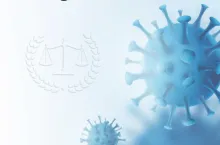The Prosecutor’s Guide to Chemical and Biological Crimes available in Ukrainian!
The purpose of the Guidebook, now available in Ukranian, is to provide police and civil prosecutors, and relevant investigative agencies, with guidance to support the successful prosecution of incidents involving the deliberate use of a chemical or biological agents. The Guidebook aims to provide awareness and insight into the current and emerging challenges related to the investigation and prosecution of such crimes.
Foreword by the Director of UNICRI Antonia Marie De Meo
